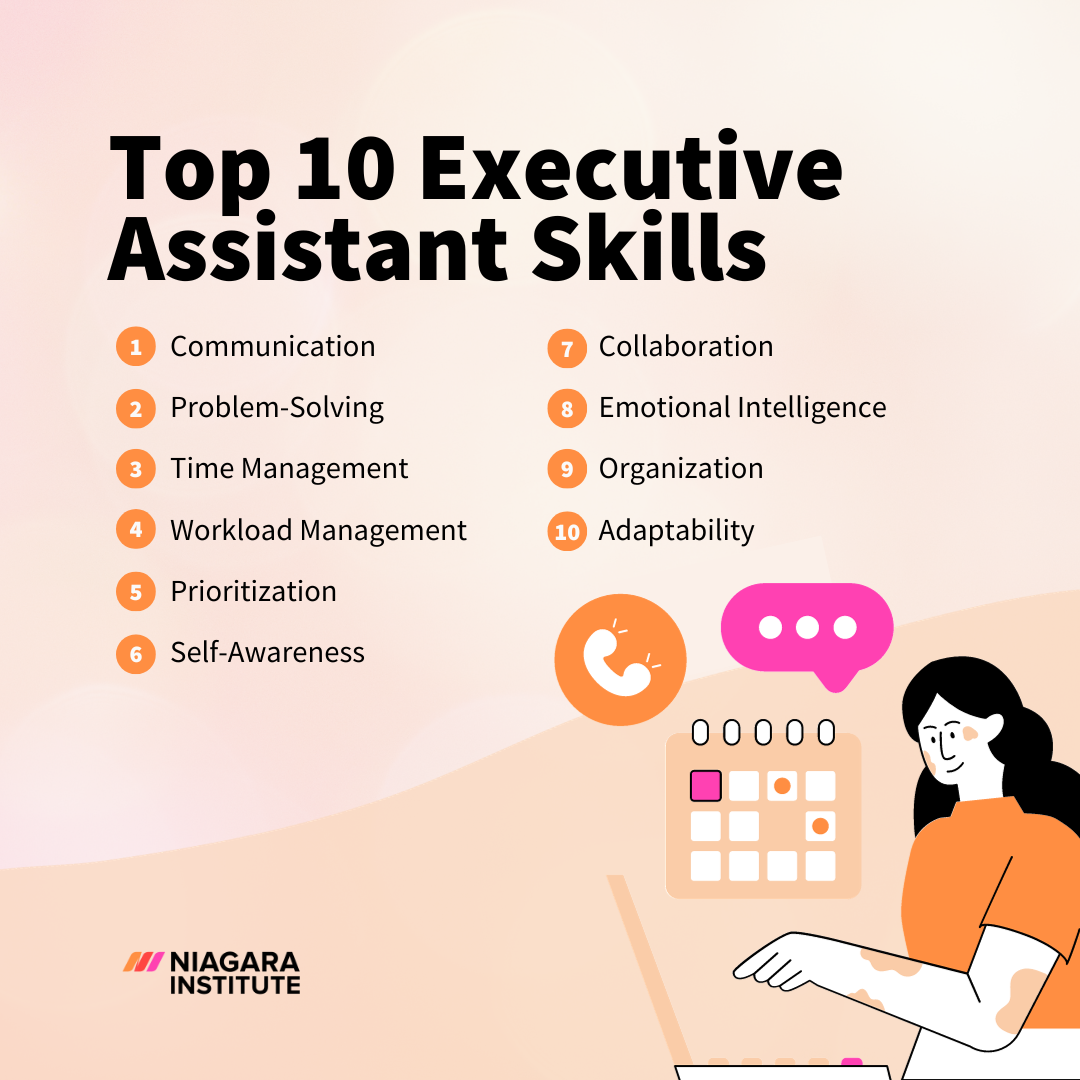5 min read
What Are Transferable Skills and Why Are They Important?
Over the course of your life, you have picked up habits, abilities, and skills that allow you to succeed in the workplace, regardless of what title...
![Executive Assistant Skills Assessment [2025]](https://www.niagarainstitute.com/hubfs/Executive%20Assistant%20Skills%20%20(1).png)
Have you ever asked yourself what exactly makes a great executive assistant (EA)? While there are many ways to answer this question, one thing is certain: A great executive assistant is the linchpin of organizational excellence, seamlessly blending handling competing priorities with timeless interpersonal finesse.
If this is the type of executive assistant you aspire to be, it will require soft skills such as self-awareness, problem-solving, time management, workload management, prioritization, communication, collaboration, emotional intelligence, organization, and adaptability. In this article, you’ll find more information about the importance of these 10 executive assistant skills, as well as a simple self-assessment that will prompt you to evaluate the state of your skills and allow you to create a development plan that accurately reflects your current areas of improvement.
Below, you will find a list of ten of the most important executive assistant skills. An emphasis has deliberately been placed on soft skills, given that the hard/technical skills requirements of an executive assistant often vary from person to person and organization to organization. Not to mention, this underscores the universal importance of transferable skills, that is, skills that transcend job titles and industry boundaries.

Communication is a fundamental skill for every executive assistant, as it refers to your ability to exchange information, both verbally and in writing, with confidence and clarity, which, in turn, commands a level of respect necessary to fulfill your mandate.
Problem-solving refers to your ability as an executive assistant to assess problems/obstacles, think critically about potential solutions, and promptly implement solutions that minimize any fallout.
Time management refers to your ability as an executive assistant to strategically allocate time in your schedule so that you may complete your tasks/projects on time but also respond to the dynamic demands of the executive(s) you are supporting at a moment’s notice, as needed.
Workload management refers to your ability to organize and schedule both your personal and executive tasks, which ensures all your responsibilities are handled and that the executive(s) under your care receive the support they need when they need it.
Prioritization refers to your ability to assess tasks, assignments, and responsibilities based on their level of importance and urgency to ensure effective time and resource allocation.
Self-awareness refers to your ability as an executive assistant to understand and recognize your own thoughts, feelings, behaviors, strengths, weaknesses, and values.
Given the inherently collaborative nature of the role, collaboration is an essential skill for executive assistants as it refers to your ability to work with colleagues, superiors, and external stakeholders and establish productive working relationships with them.
Emotional intelligence is defined as the ability to recognize, understand, and manage your own emotions as well as recognize, understand, and influence the emotions of others, according to Harvard.
Organization refers to your ability to create structure and maintain order, both physically, digitally, and mentally, to optimize productivity for yourself and the executive(s) you support.
As an executive assistant, no two days are ever the same, as such adaptability is key as it refers to your ability to flexibly navigate change, handle unexpected challenges, and swiftly adjust to evolving priorities.
Now that you have a better idea of the skills that will make you a great executive assistant, ask yourself the following series of questions. The key to this type of informal self-assessment is to be honest with yourself. The more honest you are, the better chance you have of gaining insight that will allow you to seek out development opportunities, such as training, that make a noticeable difference in your everyday life as an EA.
.png)
5 min read
Over the course of your life, you have picked up habits, abilities, and skills that allow you to succeed in the workplace, regardless of what title...
.png)
5 min read
You’ve likely witnessed it at work. That person that everyone naturally gravitates towards. They seemingly effortlessly build a network of supporters...

5 min read
Up until 2020, the level of executive support and allocated budget for professional learning and development had been on the rise. But then COVID-19...